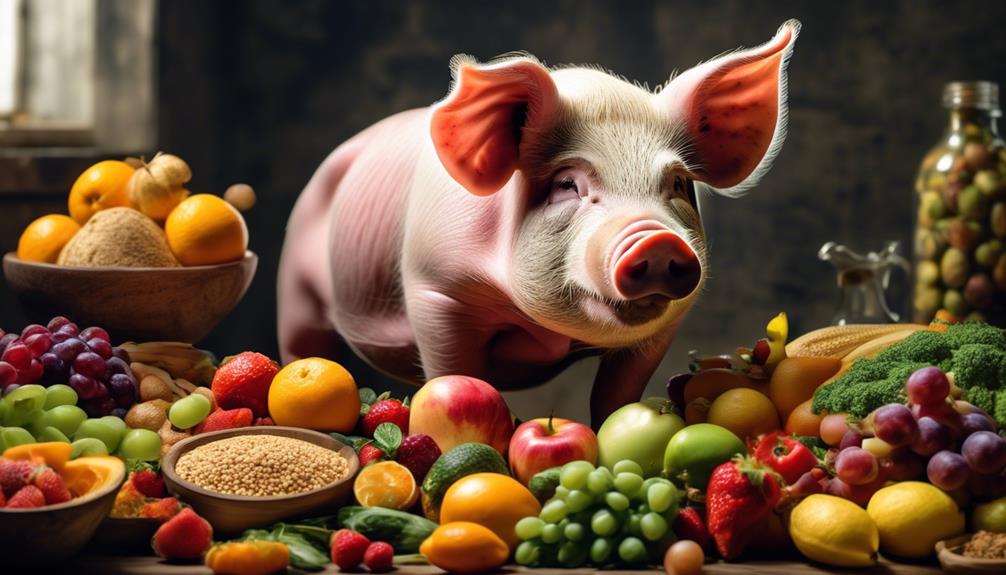Six Nutritional Strategies to Boost Pig Health
Boosting pig health is a complex task, but with the right nutritional strategies, you can significantly improve the well-being and productivity of your herd.
From balancing essential nutrients to enhancing immune function, there are six key approaches that can make a substantial difference in the overall health of your pigs.
By implementing these strategies, you'll not only ensure the health of your pigs but also optimize their growth and performance.
Understanding Pig Nutritional Needs
Understanding the nutritional needs of pigs is crucial for maintaining their health and productivity. Pig feed requirements play a significant role in ensuring that pigs receive the essential nutrients for growth, reproduction, and overall well-being. To achieve optimal health and performance, it's imperative to provide pigs with a balanced diet that meets their specific nutritional needs.
Pigs require a diet that provides the right balance of protein, carbohydrates, fats, vitamins, and minerals. Meeting these nutritional requirements is essential for supporting growth, muscle development, and immune function. In addition to meeting macronutrient needs, it's crucial to ensure that pigs receive adequate levels of micronutrients, including vitamins and minerals, to prevent deficiencies that can lead to health issues.
Nutritional balance is key to maintaining pig health and productivity. It involves formulating diets that provide the right combination of nutrients to support growth, reproductive performance, and immune function. Achieving nutritional balance also involves considering factors such as the pig's age, weight, and physiological state.
Balancing Essential Nutrients
To ensure the optimal health and productivity of pigs, achieving a balanced diet that meets their specific nutritional needs is crucial. This involves focusing on balancing essential nutrients such as protein, carbohydrates, fats, vitamins, and minerals.
Optimizing protein intake is essential for pigs as it is a building block for muscle development and overall growth. Incorporating high-quality protein sources such as soybean meal, fish meal, and canola meal can help meet these requirements.
Carbohydrates, in the form of grains and cereals, are crucial for providing energy to support daily activities and growth. It is important to ensure that the carbohydrate sources are easily digestible for the pigs to maximize their utilization.
Vitamins and minerals play a vital role in various metabolic processes and immune function. Ensuring adequate intake of these essential micronutrients through a balanced diet or supplementation is necessary for overall health and disease resistance.
Fiber intake is also crucial for maintaining digestive health and promoting satiety. Including fibrous ingredients such as alfalfa meal or soybean hulls can help achieve the recommended fiber levels in the diet.
In addition to optimizing essential nutrients, it is crucial to monitor the pigs' weight and body condition regularly. This allows for adjustments in the diet to maintain optimal weight and overall health.
Implementing Feed Additives
Consider incorporating feed additives to enhance pig health and productivity. When it comes to improving performance and optimizing digestion in pigs, feed additives play a crucial role. These additives are specifically designed to supplement the basic diet of pigs, addressing key nutritional needs and promoting overall well-being.
Feed additives can include probiotics, prebiotics, enzymes, organic acids, and essential oils. Probiotics, for example, are beneficial bacteria that promote a healthy gut environment, leading to improved digestion and nutrient absorption. Prebiotics, on the other hand, serve as food for the beneficial bacteria in the gut, further supporting digestive health. Enzymes help break down complex nutrients, making them more accessible for absorption. Organic acids act as natural antimicrobials, reducing the risk of harmful bacterial growth in the digestive system. Essential oils are known for their antimicrobial and antioxidant properties, contributing to overall gut health and performance.
Utilizing Functional Feed Ingredients
Incorporating functional feed ingredients is an effective way to further optimize pig health and productivity beyond the use of feed additives. These nutritional strategies can play a vital role in enhancing pig performance and improving gut health.
Here are some key points to consider when utilizing functional feed ingredients:
- Types of Functional Feed Ingredients:
- Prebiotics and Probiotics: These ingredients promote the growth of beneficial gut microflora, which can improve digestion and nutrient absorption in pigs.
- Enzymes: Enzymes such as phytase and carbohydrases aid in breaking down complex nutrients, enhancing digestibility and nutrient utilization in pigs.
Benefits of Functional Feed Ingredients:
- Performance Enhancement: Functional feed ingredients can contribute to better growth rates, feed efficiency, and overall performance in pigs.
- Improved Gut Health: By supporting a healthy gut microbiota and enhancing nutrient absorption, these ingredients can help maintain optimal gut health in pigs.
Managing Digestive Health
Improving pig digestive health is essential for maximizing overall production and performance. When it comes to managing digestive health, incorporating probiotic supplementation is crucial.
Probiotics are beneficial bacteria that can help maintain a healthy balance in the pig's gut microbiota, supporting optimal digestion and nutrient absorption. By adding probiotics to the pig's diet, you can enhance the population of beneficial bacteria in the gut, thereby promoting better overall digestive health.
Fiber fermentation also plays a significant role in managing digestive health in pigs. Including fermentable fibers such as beet pulp, soy hulls, and wheat bran in the diet can promote the growth of beneficial bacteria in the pig's large intestine.
This, in turn, supports the fermentation process, leading to the production of short-chain fatty acids that serve as an energy source for the pig and contribute to the overall health of the digestive system.
Enhancing Immune Function
To further bolster pig health, focus on strengthening their immune function, which is closely intertwined with their digestive well-being. Boosting immunity in pigs is essential for preventing diseases and ensuring their overall well-being. Here are some strategies to enhance their immune function:
- Provide Proper Nutrition:
Ensure that pigs receive a well-balanced diet rich in essential nutrients such as vitamins A, C, and E, as well as minerals like selenium and zinc. These nutrients play a crucial role in supporting the immune system and preventing deficiencies that can compromise pig health.
- Manage Stress Levels:
Minimize stressors in the pigs' environment, as stress can weaken their immune response. Implement measures to reduce environmental stressors such as overcrowding, extreme temperatures, or sudden changes in routine. Additionally, handling pigs calmly and gently can contribute to lower stress levels and better immune function.
Consistently implementing these strategies won't only boost the immunity of pigs but also significantly reduce the risk of diseases. By providing proper nutrition and minimizing stress, you can ensure that pigs have a robust immune system to ward off illnesses and maintain optimal health.
Minimizing Stress Through Diet

Minimizing stress through a balanced diet is crucial for maintaining the overall well-being of pigs. The dietary impact on stress reduction can't be overstated. When pigs experience stress, it can lead to decreased feed intake, compromised immune function, and overall reduced productivity. To mitigate these effects, it's essential to focus on dietary strategies that can help alleviate stress in pigs.
One effective way to minimize stress through diet is by ensuring a consistent and high-quality feed supply. Abrupt changes in feed can lead to digestive disturbances and increased stress levels in pigs. Therefore, providing a consistent and balanced diet that meets the nutritional requirements of the pigs is vital for promoting a stress-free environment.
Incorporating feed additives such as probiotics and prebiotics can also play a significant role in reducing stress. These additives promote a healthy gut microbiota, which has been linked to improved stress resilience in pigs. By supporting gut health, these additives contribute to overall stress reduction and better performance.
Additionally, it's important to pay attention to feeding management. Establishing regular feeding schedules and minimizing environmental stressors during feeding times can help create a calm and predictable feeding environment for the pigs.
Monitoring Feed Conversion Efficiency
How can you assess feed conversion efficiency to optimize the nutritional intake of your pigs?
Improving efficiency in feed conversion is crucial for pig health and production.
Tracking performance indicators can help you monitor and optimize feed conversion efficiency.
Here are some strategies to help you effectively monitor feed conversion efficiency:
- Regular Weighing:
Weigh your pigs regularly to track their growth progress. This will help you assess how efficiently they're converting feed into body weight.
- Feed Intake Monitoring:
Keep a close eye on the amount of feed your pigs consume. By tracking feed intake, you can identify any fluctuations and make necessary adjustments to improve efficiency.
Frequently Asked Questions
Can Certain Feed Additives Be Harmful to Pigs if Used in Excess?
If you overuse certain feed additives, they can be harmful to pigs. It's important to maintain a proper nutritional balance to prevent any negative effects on their health. Keep a close eye on their diet.
Are There Any Specific Functional Feed Ingredients That Can Help With Respiratory Health in Pigs?
To support respiratory health in pigs, functional feed ingredients can be beneficial. These ingredients play a crucial role in preventing disease and promoting overall well-being. Implementing nutritional strategies that focus on respiratory health can greatly benefit pig health.
How Can Pig Producers Monitor the Overall Health and Well-Being of Their Pigs Beyond Just Feed Conversion Efficiency?
To monitor your pigs' overall health and well-being beyond feed efficiency, focus on pig behavior and providing environmental enrichment. Observe their activity levels, social interactions, and response to enriching activities to gauge their wellness.
What Are Some Common Signs of Digestive Health Issues in Pigs and How Can They Be Managed Through Diet?
If your pigs have digestive issues like diarrhea, you can manage them through diet. Improve gut health with dietary interventions. Nutritional solutions play a key role in managing these problems and keeping your pigs healthy.
Are There Any Specific Nutritional Strategies That Can Help Prevent the Spread of Disease Within a Pig Herd?
To prevent disease spread within your pig herd, consider incorporating nutritional supplements and immune-boosting diets. These strategies can help bolster pig health and support disease prevention, contributing to the overall well-being of your herd.
Conclusion
Now you know six nutritional strategies to boost pig health.
By understanding their nutritional needs, balancing essential nutrients, implementing feed additives, using functional feed ingredients, managing digestive health, enhancing immune function, and minimizing stress through diet, you can ensure the health and well-being of your pigs.
Keep an eye on feed conversion efficiency and make adjustments as needed to keep your pigs healthy and thriving.
